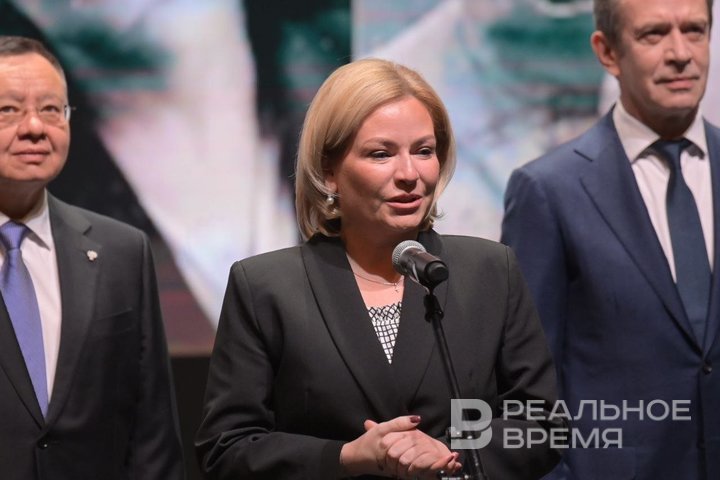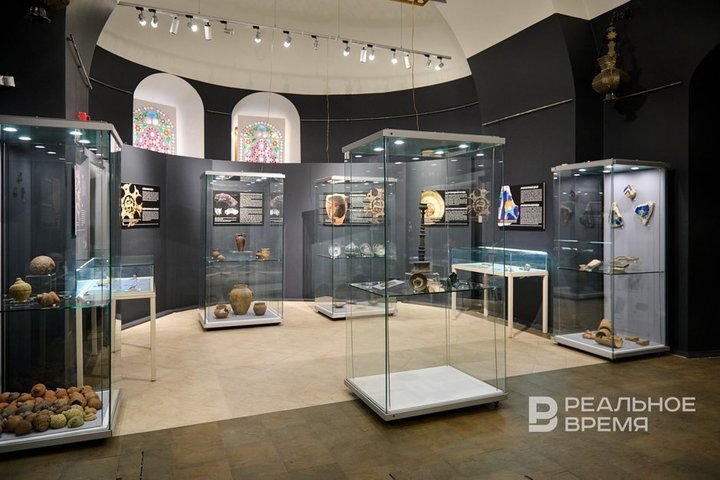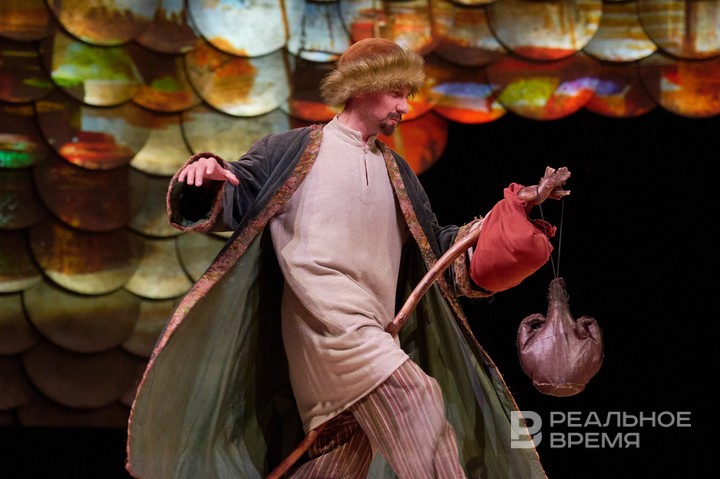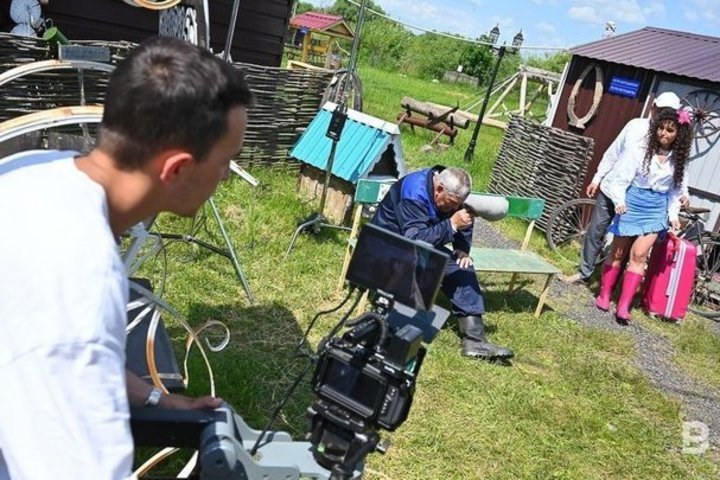The Ministry of Culture sums up the results
Olga Lyubimova shared the department's “successes” but assessed them as “satisfactory”

This week, a meeting of the final board of the Ministry of Culture of the Russian Federation was held. Minister Olga Lyubimova spoke about the work done in 2024, and also outlined the tasks for this year. Read more about the results of the work and the new project of the Ministry of Culture are in the report of Realnoe Vremya.
Culture to the masses
Olga Lyubimova, and before her, Deputy Prime Minister of the Russian Federation Tatyana Golikova began their speeches with the national project Culture, which was launched on 1 January 2019 by decree of the President of Russia. Among its tasks are to help develop culture in the regions, renovate cultural centres, libraries, museums and art schools, equip them with modern equipment and connect them to the Internet. The project should provide access to cultural events for residents of small towns and villages, support young authors, launch online platforms and broadcast concerts and performances across the country. The national project was designed to last until 2024. In general terms, Lyubimova said that the goals had been achieved. But she did not announce specific achievements or figures, and went straight to “other successes.”
Since 2022, the Ministry of Culture, together with the regional leadership, will open schools of creative industries. Last year, 26 schools were created in 25 regions with a total amount of co-financing from the state of 1.1 billion rubles (an average of 42 million rubles for each facility). This year, it is planned to open 25 schools also in 25 regions and with the same budget. In total, there are now 93 schools in 60 regions in Russia, in which 12,800 children aged 12 to 18 study (an average of 138 students in each school). provided by the press service of the Kariyev Theatre
“Infrastructure in the regions is an important element of introducing people to culture,” Lyubimova said when she moved on to the section on infrastructure projects supported by United Russia. Since 2017, the party has been implementing the Theatres for Children project together with the Ministry of Culture. Under this programme, regions receive subsidies to support creative activities and to provide technical equipment for children’s and puppet theatres. Last year, 198 theatres in 82 regions received 648.1 million roubles from the federal budget (an average of 3.3 million roubles for each facility). Under the Theatres of Small Towns programme, which covers towns with a population of less than 300,000 people, the Ministry of Culture allocated 491.7 million roubles for 151 theatres in 63 regions (an average of 3.3 million roubles for each facility). Another joint programme with United Russia is Local House of Culture. It allocates funds for the repair and modernization of cultural and leisure institutions in rural areas and small towns with a population of up to 50,000 people. In 2024, 1,562 cultural centres received funding. In total, they were allocated 1.158 billion rubles (an average of 741,000 rubles per facility). This year, within the framework of the program, they plan to repair 1,436 cultural centres with a total budget of 1.210 billion rubles (an average of 843,000 rubles per facility).
Ruins, museums and cinema
As for cultural heritage sites, restoration work is underway at more than 200 sites. Of these, restoration work has been completed at 30 cultural monuments. Among them are the Novodevichy Convent ensemble, the Factory Kitchen of the M.V. Maslennikova (now the Samara branch of the Tretyakov Gallery), the Golovkin dacha complex (also in Samara), and the Church of the Savior in the village of Ubory in the Moscow Region. In 2024, 55 sites whose condition was recognized as emergency were mothballed. “This made it possible to save them from complete destruction for further restoration," the Minister of Culture added.
“Last year, the state catalogue of the museum fund increased. This is a separate, huge effort by our colleagues,” Lyubimova noted. In 2024, 8.44 million new items were registered in the state catalogue. And the total fund amounted to 54.57 million unique objects. Last year, 72 subordinate federal museums were visited by more than 52 million people. For Pushkin's anniversary, seven museums dedicated to the work of the Russian writer were restored and re-exhibited. The total cost of the work was 127 million rubles (an average of 18 million rubles for each museum).

As for plans for 2025, the heads of all subordinate museums presented significant exhibition projects. All these events were combined into one document, which was published on the department's website. Lyubimova suggested using it as a guide when planning cultural weekends in your city or on vacation.
“It is impossible to overestimate the role of the state in the development of domestic cinema,” said the Minister of Culture, moving on to figures on financing the film industry. Last year, work was completed on 298 films that received support from the Ministry of Culture. Among them are 61 full-length feature films, 148 documentary films and 89 animated films. In addition, 151 new national films were launched, of which 46 are feature films, 64 documentary films and 41 animated films. Lyubimova did not say how much money the Ministry of Culture allocated for the production of these projects. But she shared the general figures for the box office.
A total of 214 Russian films were released, of which 84 received funding from the Ministry of Culture and the Cinema Fund. Last year, box office receipts for domestic films amounted to 36.1 billion rubles, which is 77.7% of the total box office receipts. The number of viewers of Russian films increased by 9.4% compared to 2023 and amounted to almost 100 million people. However, Lyubimova did not specify how the viewers were counted. If only traditional cinemas were taken into account, then it was probably about tickets sold, and the viewers themselves could be much fewer. She also did not say whether streaming services, where the number of unique viewers can be calculated, were included in the statistics or not.
Theatre, circus, abroad and a new national project
In 2024, 288 theatre groups and 62 national groups went on tour and gave concerts. The Minister of Culture also noted that 10 groups from the LPR and DPR gave performances in more than a hundred cities in Russia. As part of the so-called international exchange, creative groups from Abkhazia, Azerbaijan, Armenia, Belarus, Kazakhstan, Kyrgyzstan, Tajikistan, Uzbekistan and South Ossetia came to us.

In 2024, the Ministry of Culture allocated 72.9 million rubles in grant support for the development of circus arts. More than 60 performances were held with this money (an average of 1.2 million rubles per performance) with a reach of about 65,000 spectators. In total, 2,611 performances were held on circus stages last year, which were seen by 3.3 million spectators.
One of the areas of work of the Ministry of Culture to support and promote the Russian language is the Days of Russia in different countries. Last year, such events were held in Belarus, France, South Africa, Ethiopia and Cuba. The Ministry of Culture also held 130 cultural events together with its Chinese colleagues in 30 cities in Russia and 50 cities in China. In Bangkok last April, the grand opening of the Year of Cultural Exchanges and Tourism between Russia and Thailand took place, as well as a festival of Russian culture with the participation of the Pyatnitsky Choir.
The Ministry of Culture held similar events in Brazil. But on a larger scale. Ballet dancer Nikolai Tsiskaridze, opera singer Ildar Abdrazakov, the troupe of the B. Eifman Ballet Theatre and the Igor Butman Jazz Orchestra came to the Russian Seasons in Brazil. In total, from June to December 2024, 30 events were held at 18 venues, which were attended by about 16,000 people. Similar cultural events were held in Serbia, Vietnam and Turkmenistan.

“An important area of our support is the promotion of national cinema abroad,” said Olga Lyubimova. Last year, the Russian Film Festival was held in 16 countries (Belarus, Vietnam, India, Iran, Kazakhstan, Kyrgyzstan, China, Cuba, Laos, Nicaragua, Norway, the UAE, Serbia, Tajikistan, Turkmenistan, France). Over the past year, 20 Russian films were shown in these countries.
This year, the Ministry of Culture has developed a new federal project Family Values and Cultural Infrastructure as part of the national project Family. It is planned to allocate 367.23 billion rubles from the budget for it by 2030, of which 28.96 billion is this year's budget. According to Lyubimova, this money will be used to repair cultural centres, theatres, art schools, museums, create model libraries and cinemas, and equip cultural institutions. “But we will pay special attention to institutions within walking distance — cultural centres and libraries," said Lyubimova. The project will begin in 2026. The Minister of Culture added that the department plans to support 500 best libraries and 1,200 cultural centres. Although it is not the best libraries that need help, but rather those whose situation is very sad.
Also, starting this year, children's cultural and educational centres will begin to appear. In 2025, they should open at 25 federal museums. Starting next year, the program will go to the regions. By 2030, the Ministry of Culture plans to open 1,500 such centres. “Master classes, mini-exhibitions, film screenings, creative workshops, lectures, and discussions for children and teenagers will be held there," Olga Lyubimova summarized.
During the final board meeting, the Minister of Culture assessed the department's work as “satisfactory.” There were no objections from those present.
Ekaterina Petrova is a book reviewer of Realnoe Vremya online newspaper and the author of Buns with Poppy Seeds Telegram channel.